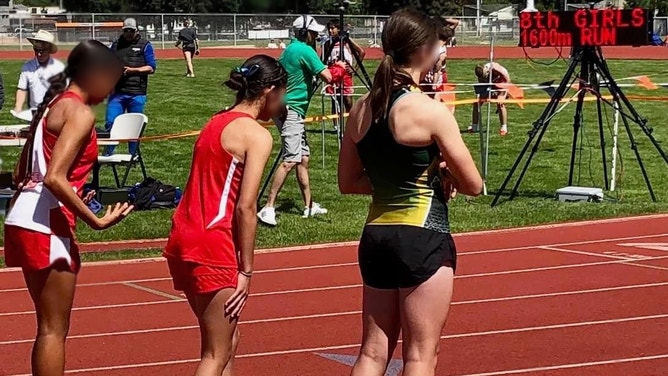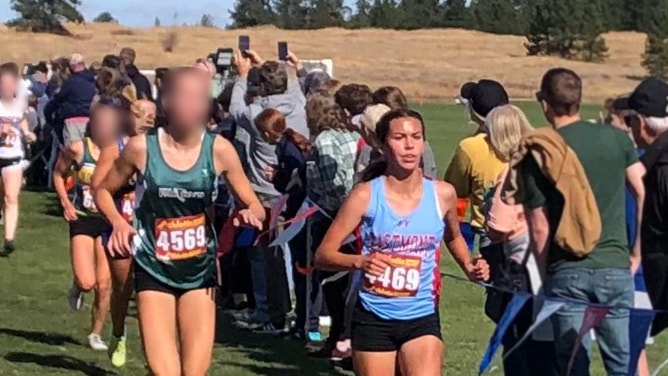Teenage Girl Who Lost To Trans Runner Speaks Out: 'Unfair' For Everyone
Last spring, Washington native Ahnaleigh Wilson, a then-14-year-old female track & field athlete, came in second place in the 1600m race at the Cashmere Junior Olympics. But she noticed something different about the runner that beat her.
"Their legs were super muscular and the same with their arms," Wilson told OutKick. "It was pretty obvious … like the comparison between all the girls lined up on the podium and this transgender athlete. It was completely different."
Wilson didn't know that there was a biological male competing in the event until after the race, although she had suspicions while standing next to the athlete at the starting line.
"I didn't notice that it was a transgender athlete; I had no idea," she said. "I just noticed that they were built a little differently in their legs. But since we were lined up to race, I was just focused on the race.
"When the race ended, that transgender athlete had beaten me, but I still didn't know. We went to get up on the podium, and I heard people … were mad about something, but I still didn't know what.

Ahnaleigh Wilson, a high school girls' track & field athlete, spoke to OutKick about losing to a biological male and why it's unfair to all athletes.
(Elizabeth Wilson)
"I later found out they were upset that a transgender athlete had competed against a bunch of girls. And when I found out, which was later that day, I was pretty discouraged."
Last week, Ahnaleigh Wilson delivered an emotional speech at an event called the "Lincoln Day Dinner" that was attended by OutKick's Riley Gaines.
Wilson talked about how she felt losing to a biological male in a race for girls and explained why she felt it was unfair to all the athletes, including the male.
"My biggest takeaway is that allowing boys to compete in girls' sports isn't working, and it is not fair. It isn't fair, and it isn't working for biological girls. And it isn't fair, and it isn't working for transgender athletes," Wilson said at the event.
WATCH HER SPEECH:
Ahnaleigh's Speech at Liberty Day Dinner
OutKick asked Ahnaleigh why she felt it was not only unfair to the girls, but to the biological male athlete as well.
"Those girls and all those parents were already upset and frustrated. So, that transgender athlete wasn't getting a lot of support from them or anyone," she said.
This is an important point raised by the now-15-year-old high school athlete.
Of course, it's unfair to force these young women to compete against males in sports.
However, this transgender athlete is also a young person who is now facing backlash from adults.

Ahnaleigh Wilson, a high school girls' track & field athlete, spoke to OutKick about losing to a biological male and why it's unfair to all athletes.
(Elizabeth Wilson)
It's a failure by the adults in leadership who allow these things to happen, not the fault of this confused young person who is just following directions.
That was something that Ahnaleigh's mother, Elizabeth, also wanted to make clear.
"Our message is fairness and protection of biological girls, but also that these are children, transgender, female, and we really try to put that across," she said. "We don't want to spew any kind of hate, because we do realize this 14-year-old transgender athlete is a child."
Part of the problem in this specific case is that we are dealing with high school athletes. At higher levels of competition, there are regulations regarding transgender athletes.
That being said, horomone blockers and surgery cannot undo male puberty and that advantage still exists, regardless of what "trans advocates" try to say.
However, at the high school level and below, there is no such regulation.
"The reality is that kids under 18 cannot transition. They don't get hormones. They don't get anything. So, they're not even transgender," Elizabeth Wilson said.
"We keep saying transgender [to be] respectful, but the reality is that they're males. They're boys racing against girls."

Ahnaleigh Wilson, a high school girls' track & field athlete, spoke to OutKick about losing to a biological male and why it's unfair to all athletes.
(Elizabeth Wilson)
All of this has taken a huge toll on Ahnaleigh, especially since she spoke out about the unfairness of competing against biological males.
"She's struggling with anxiety attacks and panic attacks where her mind has just gone blank. Her teachers account for wandering at school one day… She couldn't speak. She was crying," her mother told OutKick.
See, this is the part that's often glossed over by the "transgender advocates." They argue that we must allow athletes to compete as they identify, because otherwise, it's detrimental to their mental health.
But what about these young girls who are forced to compete on an unfair playing field? Who is thinking about their mental health?
"Everyone was just saying at the meet, how all the girls, including me… just needed to suck it up and just deal with it," Ahnaleigh said.
"That's the way things are – the transgender athlete was just the priority… It didn't matter how we felt. We just had to deal with it. Hearing that is sad and disappointing because it felt like they were just ignoring how we felt completely and didn't want to listen to our frustrations at all."
In an effort to validate the feelings of one confused young person, dozens of young women are being ignored and forced to battle with the unfairness of the situation or risk being labeled horrible things.
"My family and I have been told by adults that we are transphobic. That I am a sore loser and that I value winning more than a human life. We have also been told that it will be our fault and that we will be the ones responsible if this transgender athlete takes their life," Ahnaleigh said during her speech at the Lincoln Day Dinner.
"I feel like the same people who are attacking female athletes for speaking out do not care about the mental tolls and struggles that this is also taking on female athletes."
Ahnaleigh's story is heartbreaking, but it's unfortunately one that is becoming far too common in American society.
Girls and women are being pushed aside in order to advance an agenda that ignores reason, logic and common sense.
While girls like Ahnaleigh shouldn't be expected to have to fight for themselves, it's encouraging that many are saying that enough is enough.
It's time for the adults in the room to act like adults and solve this problem, now.
FULL INTERVIEW: